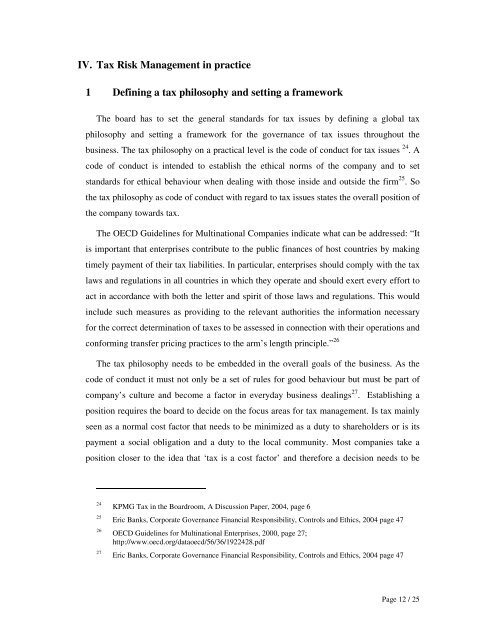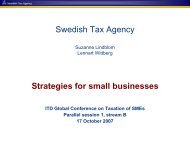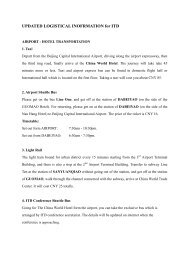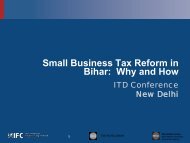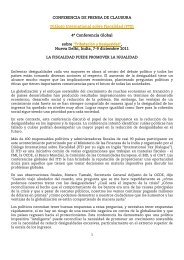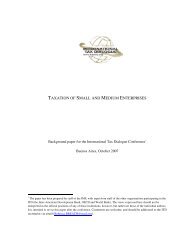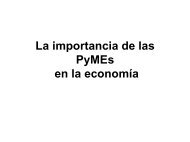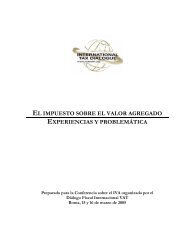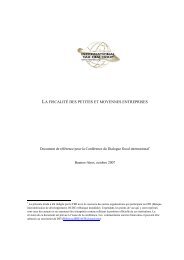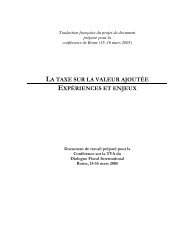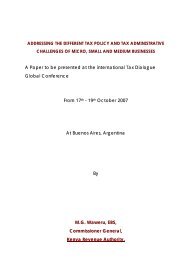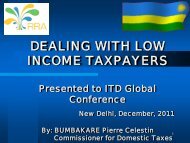Tax Risk Management and Board Responsibility - International Tax ...
Tax Risk Management and Board Responsibility - International Tax ...
Tax Risk Management and Board Responsibility - International Tax ...
Create successful ePaper yourself
Turn your PDF publications into a flip-book with our unique Google optimized e-Paper software.
IV. <strong>Tax</strong> <strong>Risk</strong> <strong>Management</strong> in practice<br />
1 Defining a tax philosophy <strong>and</strong> setting a framework<br />
The board has to set the general st<strong>and</strong>ards for tax issues by defining a global tax<br />
philosophy <strong>and</strong> setting a framework for the governance of tax issues throughout the<br />
business. The tax philosophy on a practical level is the code of conduct for tax issues 24 . A<br />
code of conduct is intended to establish the ethical norms of the company <strong>and</strong> to set<br />
st<strong>and</strong>ards for ethical behaviour when dealing with those inside <strong>and</strong> outside the firm 25 . So<br />
the tax philosophy as code of conduct with regard to tax issues states the overall position of<br />
the company towards tax.<br />
The OECD Guidelines for Multinational Companies indicate what can be addressed: “It<br />
is important that enterprises contribute to the public finances of host countries by making<br />
timely payment of their tax liabilities. In particular, enterprises should comply with the tax<br />
laws <strong>and</strong> regulations in all countries in which they operate <strong>and</strong> should exert every effort to<br />
act in accordance with both the letter <strong>and</strong> spirit of those laws <strong>and</strong> regulations. This would<br />
include such measures as providing to the relevant authorities the information necessary<br />
for the correct determination of taxes to be assessed in connection with their operations <strong>and</strong><br />
conforming transfer pricing practices to the arm’s length principle.” 26<br />
The tax philosophy needs to be embedded in the overall goals of the business. As the<br />
code of conduct it must not only be a set of rules for good behaviour but must be part of<br />
company’s culture <strong>and</strong> become a factor in everyday business dealings 27 . Establishing a<br />
position requires the board to decide on the focus areas for tax management. Is tax mainly<br />
seen as a normal cost factor that needs to be minimized as a duty to shareholders or is its<br />
payment a social obligation <strong>and</strong> a duty to the local community. Most companies take a<br />
position closer to the idea that ‘tax is a cost factor’ <strong>and</strong> therefore a decision needs to be<br />
24<br />
25<br />
26<br />
27<br />
KPMG <strong>Tax</strong> in the <strong>Board</strong>room, A Discussion Paper, 2004, page 6<br />
Eric Banks, Corporate Governance Financial <strong>Responsibility</strong>, Controls <strong>and</strong> Ethics, 2004 page 47<br />
OECD Guidelines for Multinational Enterprises, 2000, page 27;<br />
http://www.oecd.org/dataoecd/56/36/1922428.pdf<br />
Eric Banks, Corporate Governance Financial <strong>Responsibility</strong>, Controls <strong>and</strong> Ethics, 2004 page 47<br />
Page 12 / 25


